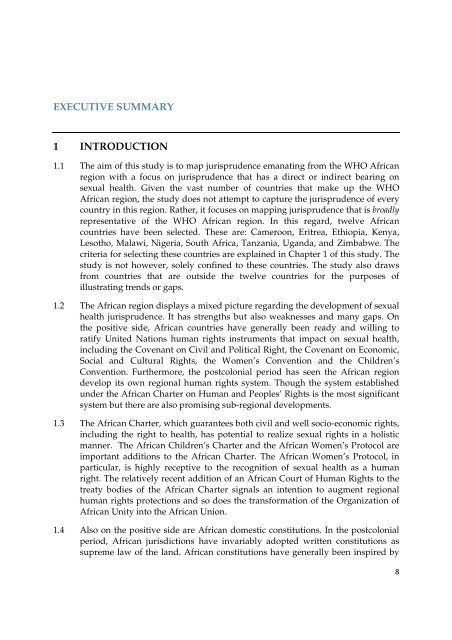sexual health and human rights in the african region - The ICHRP
sexual health and human rights in the african region - The ICHRP
sexual health and human rights in the african region - The ICHRP
Create successful ePaper yourself
Turn your PDF publications into a flip-book with our unique Google optimized e-Paper software.
EXECUTIVE SUMMARY<br />
1 INTRODUCTION<br />
1.1 <strong>The</strong> aim of this study is to map jurisprudence emanat<strong>in</strong>g from <strong>the</strong> WHO African<br />
<strong>region</strong> with a focus on jurisprudence that has a direct or <strong>in</strong>direct bear<strong>in</strong>g on<br />
<strong>sexual</strong> <strong>health</strong>. Given <strong>the</strong> vast number of countries that make up <strong>the</strong> WHO<br />
African <strong>region</strong>, <strong>the</strong> study does not attempt to capture <strong>the</strong> jurisprudence of every<br />
country <strong>in</strong> this <strong>region</strong>. Ra<strong>the</strong>r, it focuses on mapp<strong>in</strong>g jurisprudence that is broadly<br />
representative of <strong>the</strong> WHO African <strong>region</strong>. In this regard, twelve African<br />
countries have been selected. <strong>The</strong>se are: Cameroon, Eritrea, Ethiopia, Kenya,<br />
Lesotho, Malawi, Nigeria, South Africa, Tanzania, Ug<strong>and</strong>a, <strong>and</strong> Zimbabwe. <strong>The</strong><br />
criteria for select<strong>in</strong>g <strong>the</strong>se countries are expla<strong>in</strong>ed <strong>in</strong> Chapter 1 of this study. <strong>The</strong><br />
study is not however, solely conf<strong>in</strong>ed to <strong>the</strong>se countries. <strong>The</strong> study also draws<br />
from countries that are outside <strong>the</strong> twelve countries for <strong>the</strong> purposes of<br />
illustrat<strong>in</strong>g trends or gaps.<br />
1.2 <strong>The</strong> African <strong>region</strong> displays a mixed picture regard<strong>in</strong>g <strong>the</strong> development of <strong>sexual</strong><br />
<strong>health</strong> jurisprudence. It has strengths but also weaknesses <strong>and</strong> many gaps. On<br />
<strong>the</strong> positive side, African countries have generally been ready <strong>and</strong> will<strong>in</strong>g to<br />
ratify United Nations <strong>human</strong> <strong>rights</strong> <strong>in</strong>struments that impact on <strong>sexual</strong> <strong>health</strong>,<br />
<strong>in</strong>clud<strong>in</strong>g <strong>the</strong> Covenant on Civil <strong>and</strong> Political Right, <strong>the</strong> Covenant on Economic,<br />
Social <strong>and</strong> Cultural Rights, <strong>the</strong> Women’s Convention <strong>and</strong> <strong>the</strong> Children’s<br />
Convention. Fur<strong>the</strong>rmore, <strong>the</strong> postcolonial period has seen <strong>the</strong> African <strong>region</strong><br />
develop its own <strong>region</strong>al <strong>human</strong> <strong>rights</strong> system. Though <strong>the</strong> system established<br />
under <strong>the</strong> African Charter on Human <strong>and</strong> Peoples’ Rights is <strong>the</strong> most significant<br />
system but <strong>the</strong>re are also promis<strong>in</strong>g sub-<strong>region</strong>al developments.<br />
1.3 <strong>The</strong> African Charter, which guarantees both civil <strong>and</strong> well socio-economic <strong>rights</strong>,<br />
<strong>in</strong>clud<strong>in</strong>g <strong>the</strong> right to <strong>health</strong>, has potential to realize <strong>sexual</strong> <strong>rights</strong> <strong>in</strong> a holistic<br />
manner. <strong>The</strong> African Children’s Charter <strong>and</strong> <strong>the</strong> African Women’s Protocol are<br />
important additions to <strong>the</strong> African Charter. <strong>The</strong> African Women’s Protocol, <strong>in</strong><br />
particular, is highly receptive to <strong>the</strong> recognition of <strong>sexual</strong> <strong>health</strong> as a <strong>human</strong><br />
right. <strong>The</strong> relatively recent addition of an African Court of Human Rights to <strong>the</strong><br />
treaty bodies of <strong>the</strong> African Charter signals an <strong>in</strong>tention to augment <strong>region</strong>al<br />
<strong>human</strong> <strong>rights</strong> protections <strong>and</strong> so does <strong>the</strong> transformation of <strong>the</strong> Organization of<br />
African Unity <strong>in</strong>to <strong>the</strong> African Union.<br />
1.4 Also on <strong>the</strong> positive side are African domestic constitutions. In <strong>the</strong> postcolonial<br />
period, African jurisdictions have <strong>in</strong>variably adopted written constitutions as<br />
supreme law of <strong>the</strong> l<strong>and</strong>. African constitutions have generally been <strong>in</strong>spired by<br />
8
















